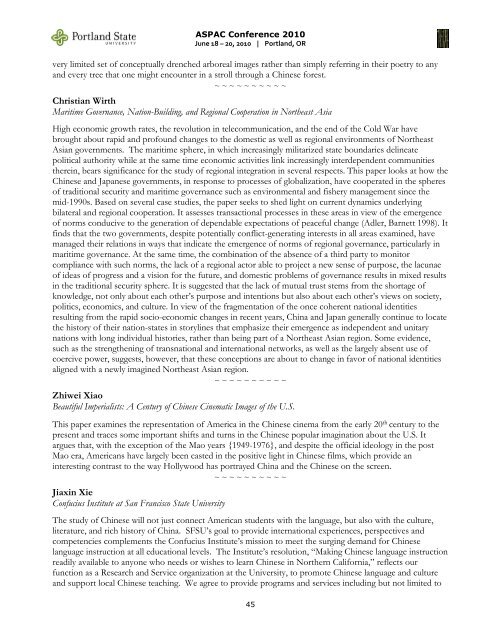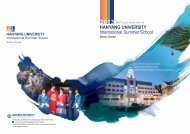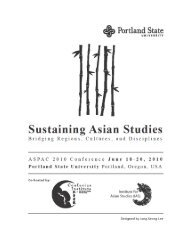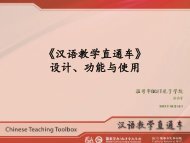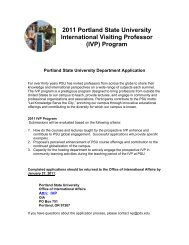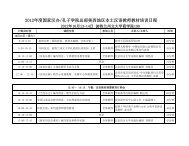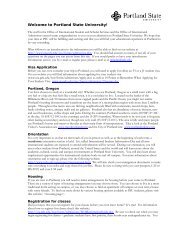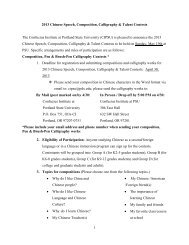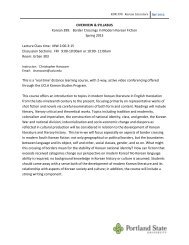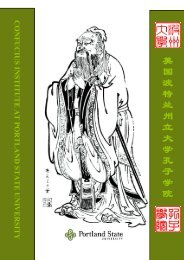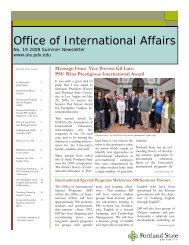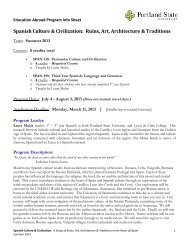ABSTRACTS - oia - Portland State University
ABSTRACTS - oia - Portland State University
ABSTRACTS - oia - Portland State University
You also want an ePaper? Increase the reach of your titles
YUMPU automatically turns print PDFs into web optimized ePapers that Google loves.
ASPAC Conference 2010<br />
June 18 – 20, 2010 | <strong>Portland</strong>, OR<br />
very limited set of conceptually drenched arboreal images rather than simply referring in their poetry to any<br />
and every tree that one might encounter in a stroll through a Chinese forest.<br />
~ ~ ~ ~ ~ ~ ~ ~ ~ ~<br />
Christian Wirth<br />
Maritime Governance, Nation-Building, and Regional Cooperation in Northeast Asia<br />
High economic growth rates, the revolution in telecommunication, and the end of the Cold War have<br />
brought about rapid and profound changes to the domestic as well as regional environments of Northeast<br />
Asian governments. The maritime sphere, in which increasingly militarized state boundaries delineate<br />
political authority while at the same time economic activities link increasingly interdependent communities<br />
therein, bears significance for the study of regional integration in several respects. This paper looks at how the<br />
Chinese and Japanese governments, in response to processes of globalization, have cooperated in the spheres<br />
of traditional security and maritime governance such as environmental and fishery management since the<br />
mid-1990s. Based on several case studies, the paper seeks to shed light on current dynamics underlying<br />
bilateral and regional cooperation. It assesses transactional processes in these areas in view of the emergence<br />
of norms conducive to the generation of dependable expectations of peaceful change (Adler, Barnett 1998). It<br />
finds that the two governments, despite potentially conflict-generating interests in all areas examined, have<br />
managed their relations in ways that indicate the emergence of norms of regional governance, particularly in<br />
maritime governance. At the same time, the combination of the absence of a third party to monitor<br />
compliance with such norms, the lack of a regional actor able to project a new sense of purpose, the lacunae<br />
of ideas of progress and a vision for the future, and domestic problems of governance results in mixed results<br />
in the traditional security sphere. It is suggested that the lack of mutual trust stems from the shortage of<br />
knowledge, not only about each other’s purpose and intentions but also about each other’s views on society,<br />
politics, economics, and culture. In view of the fragmentation of the once coherent national identities<br />
resulting from the rapid socio-economic changes in recent years, China and Japan generally continue to locate<br />
the history of their nation-states in storylines that emphasize their emergence as independent and unitary<br />
nations with long individual histories, rather than being part of a Northeast Asian region. Some evidence,<br />
such as the strengthening of transnational and international networks, as well as the largely absent use of<br />
coercive power, suggests, however, that these conceptions are about to change in favor of national identities<br />
aligned with a newly imagined Northeast Asian region.<br />
~ ~ ~ ~ ~ ~ ~ ~ ~ ~<br />
Zhiwei Xiao<br />
Beautiful Imperialists: A Century of Chinese Cinematic Images of the U.S.<br />
This paper examines the representation of America in the Chinese cinema from the early 20 th century to the<br />
present and traces some important shifts and turns in the Chinese popular imagination about the U.S. It<br />
argues that, with the exception of the Mao years {1949-1976}, and despite the official ideology in the post<br />
Mao era, Americans have largely been casted in the positive light in Chinese films, which provide an<br />
interesting contrast to the way Hollywood has portrayed China and the Chinese on the screen.<br />
~ ~ ~ ~ ~ ~ ~ ~ ~ ~<br />
Jiaxin Xie<br />
Confucius Institute at San Francisco <strong>State</strong> <strong>University</strong><br />
The study of Chinese will not just connect American students with the language, but also with the culture,<br />
literature, and rich history of China. SFSU’s goal to provide international experiences, perspectives and<br />
competencies complements the Confucius Institute’s mission to meet the surging demand for Chinese<br />
language instruction at all educational levels. The Institute’s resolution, “Making Chinese language instruction<br />
readily available to anyone who needs or wishes to learn Chinese in Northern California,” reflects our<br />
function as a Research and Service organization at the <strong>University</strong>, to promote Chinese language and culture<br />
and support local Chinese teaching. We agree to provide programs and services including but not limited to<br />
45


